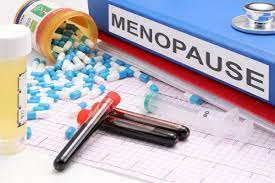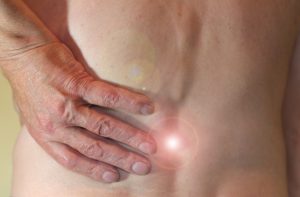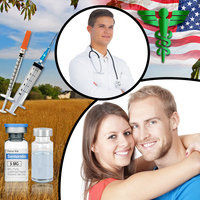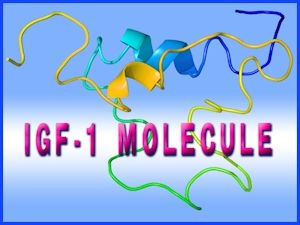Can Testosterone Replacement Therapy Help Women? YES!
Testosterone. Everyone knows that the word testosterone means the “manly hormone.”  Other words associated with testosterone are aggression, strength, powerful, bulging muscles, and masculinity.
Other words associated with testosterone are aggression, strength, powerful, bulging muscles, and masculinity.
Also, a lack of testosterone is often used to describe men who appear to lack those qualities. A sensitive, emotional man with an unassuming physique is commonly referred to as having “low-T” (aka low testosterone levels).
But what about women?
Can testosterone help women stay healthy? This is indeed a controversial question. Men who are taking Testosterone Replacement Therapy (TRT) with creams are warned to not let a women touch them in the area where they have applied the testosterone cream. And many women are concerned that testosterone could cause them to suffer many adverse side effects (facial hair growth, a deepening voice, and bigger, unfeminine muscles).
But the evidence has found that when correctly used, testosterone can be a lifesaver for women if they can get their doctor to prescribe it.
Did you know that a young women’s ovaries pump out around 3 or 4 times more testosterone than estrogen? This should make us look deeply at testosterone as a male hormone and estrogen as a female hormone.
When menopausal symptoms strike, and women suffer from the painful effects of “the change,” testosterone could be helpful since women, like men, suffer from hormone loss as they age.
Most doctors are quick on the draw to treat menopausal women with progesterone and estrogen to tamp down the fury of menopause. But, regrettably, they are reluctant to prescribe testosterone for women.
estrogen to tamp down the fury of menopause. But, regrettably, they are reluctant to prescribe testosterone for women.
Why is this? It’s common sense to realize that the hormones in our bodies need to be balanced. That includes estrogen in men and testosterone in women. Any imbalance will result in discomfort at best and, worse, some adverse developments that could grow into severe health issues.
In 2018, the International Census Group concluded that testosterone was a crucial hormone for women, regardless of their age. So why are doctors hesitant in prescribing testosterone, and more women are not demanding it?
Stigma
No doubt about it. There is a stigma surrounding the use of testosterone by women despite any potential health benefits.
A recent study called “A Personal Prospective on Testosterone Therapy in Women – What we Know in 2022,” by Gary Donovitz of the Morehouse School of Medicine, obstetrics and gynecology department concluded that the medical profession had been disinclined to offer testosterone to women based on outdated facts.
Donovitz makes a strong case for the use of TRT in women, stating testosterone has been used to treat perimenopause and menopause symptoms for over eight decades years in foreign countries.
So why not America? Several reasons. First, there is the stigma of the women’s Soviet gymnastic teams of years past that were more muscular than many male weightlifters.
Second, all of the potentially harmful side effects of excess testosterone in males are mistakenly thought to be far worse in women. The key point concerning side effects is dosage; a small, measured dose is no more dangerous to women than men.
Third, there is The Women’s Health Initiative of 2002. This research comprised more than 160,000 postmenopausal women’s health issues, including hormone replacement consisting of estrogen alone or estrogen combined with progesterone.
The study initially reported that the combined use of estrogen and progesterone elevated the risk of breast cancer, deep vein thrombosis, and Alzheimer's. Soon, the number of women using HRT plummeted, making things way more confusing. If women were apprehensive about TRT before, they were now running for the exit.
And this is sad since, for over 70 years, testosterone has been found to be protective against debilitating conditions that afflict women such as…
• Breast Cancer. The Testosterone Therapy and Breast Cancer Incidence Study monitored 2,377 menopausal women for nine years, each of whom was on TRT. The women showed a 35.5% reduction in breast cancer occurrence compared to age-related Surveillance Epidemiology and End Results (SEER) incidence rates. Annually, in the United States, around 240,000 women develop breast cancer. About 40,000 will die from it. However, the Testosterone and Breast Cancer Incidence suggests that TRT might prevent over 85,000 breast cancer cases yearly and, therefore, several thousand breast cancer deaths.
• Another study, called The Dayton Study, was conducted simultaneously with the Testosterone and Breast Cancer Incidence Study. It also found a significantly lower (39%) incidence of breast cancer in testosterone users. Here’s why. Estrogen stimulates breast tissue, assuming that breast tissue is hormone-receptor-positive. However, when testosterone is present, it binds to the testosterone androgen receptor complex (T-AR) and mitigates the effects of estrogen. Also, the T-AR downregulates the receptor for estrogen and increases apoptosis (a type of cell death) of breast cancer cell lines.
• Osteoporosis. One in 7 women will develop osteoporosis after the age of 50. Of those, approximately half will sustain an eventual fracture. In times past, estrogen deficiency was blamed for osteoporosis in women, while the same condition in men is blamed on testosterone deficiency. Isn’t it weird that there are different biochemical triggers for each sex? Countless studies have found that androgen (e.g., testosterone) produces the differentiation of osteoblasts' bone cells, and mature osteoblasts boost bone formation and bone density in both men and women. Still, many doctors refuse to treat women with testosterone due to alleged unknown effects.
blamed for osteoporosis in women, while the same condition in men is blamed on testosterone deficiency. Isn’t it weird that there are different biochemical triggers for each sex? Countless studies have found that androgen (e.g., testosterone) produces the differentiation of osteoblasts' bone cells, and mature osteoblasts boost bone formation and bone density in both men and women. Still, many doctors refuse to treat women with testosterone due to alleged unknown effects.
• An awakened libido. It’s estimated that 1 in 10 women suffer from a diminished sex drive. This may be the choice of one or both partners in the relationship. But perhaps it is not their choice. For those couples, TRT is exactly what the doctor ordered! TRT can skyrocket libido by enlarging the clitoris, increasing sexual pleasure.
• Androgen receptors. Androgen receptors are nuclear receptors activated by binding any of the androgenic hormones, including testosterone and dihydrotestosterone. Testosterone has androgen receptors all over the female body – not just the male body. Androgen receptors are found in almost all tissues, translating into significant relief from menopausal symptoms, as found by Menopause Rating Scale questionnaires offered to women receiving TRT.
What about the side effects of Testosterone in women?
Possible side effects from TRT are an increased risk of breast and/or uterine cancer, acne, unwanted hair growth, and a deepening of the voice. However, always remember that  excessive dosage is the primary cause of these side effects. The key is dosing is finding the “sweet spot”...too small a dose will not deliver benefits, and too large will raise the risk of adverse side effects. Start small and monitor the results.
excessive dosage is the primary cause of these side effects. The key is dosing is finding the “sweet spot”...too small a dose will not deliver benefits, and too large will raise the risk of adverse side effects. Start small and monitor the results.
Both men and women need to be proactive about their medical care, and they can always search for the right medical team to meet their needs. If your doctor refuses to prescribe testosterone based on gender only, always get a second opinion.
Reference
https://www.ncbi.nlm.nih.gov/pmc/articles/PMC6329173/
Contact Us For A Fast And Professional Response

- Cheyenne Sermorelin for HGH Deficiency [Last Updated On: April 6th, 2023] [Originally Added On: November 3rd, 2018]
- Milwaukee Sermorelin for HGH Deficiency [Last Updated On: April 19th, 2023] [Originally Added On: November 3rd, 2018]
- Madison Sermorelin for HGH Deficiency [Last Updated On: February 14th, 2023] [Originally Added On: November 3rd, 2018]
- Green Bay Sermorelin for HGH Deficiency [Last Updated On: May 10th, 2023] [Originally Added On: November 3rd, 2018]
- Charleston Sermorelin for HGH Deficiency [Last Updated On: February 26th, 2023] [Originally Added On: November 3rd, 2018]
- Vancouver Sermorelin for HGH Deficiency [Last Updated On: October 2nd, 2023] [Originally Added On: November 3rd, 2018]
- Tacoma Sermorelin for HGH Deficiency [Last Updated On: May 28th, 2023] [Originally Added On: November 3rd, 2018]
- Spokane Sermorelin for HGH Deficiency [Last Updated On: March 23rd, 2023] [Originally Added On: November 3rd, 2018]
- Seattle Sermorelin for HGH Deficiency [Last Updated On: May 16th, 2023] [Originally Added On: November 3rd, 2018]
- Bellevue Sermorelin for HGH Deficiency [Last Updated On: March 6th, 2023] [Originally Added On: November 3rd, 2018]
- Virginia Beach Sermorelin for HGH Deficiency [Last Updated On: March 23rd, 2023] [Originally Added On: November 3rd, 2018]
- Richmond Sermorelin for HGH Deficiency [Last Updated On: April 23rd, 2023] [Originally Added On: November 3rd, 2018]
- Portsmouth Sermorelin for HGH Deficiency [Last Updated On: February 18th, 2023] [Originally Added On: November 3rd, 2018]
- Norfolk Sermorelin for HGH Deficiency [Last Updated On: October 12th, 2023] [Originally Added On: November 3rd, 2018]
- Newport News Sermorelin for HGH Deficiency [Last Updated On: January 7th, 2023] [Originally Added On: November 3rd, 2018]
- Hampton Sermorelin for HGH Deficiency [Last Updated On: April 17th, 2023] [Originally Added On: November 3rd, 2018]
- Chesapeake Sermorelin for HGH Deficiency [Last Updated On: March 27th, 2023] [Originally Added On: November 3rd, 2018]
- Arlington, Virginia Sermorelin for HGH Deficiency [Last Updated On: July 24th, 2023] [Originally Added On: November 3rd, 2018]
- Alexandria Sermorelin for HGH Deficiency [Last Updated On: May 27th, 2023] [Originally Added On: November 3rd, 2018]
- Montpelier Sermorelin for HGH Deficiency [Last Updated On: May 2nd, 2023] [Originally Added On: November 3rd, 2018]
- West Valley City Sermorelin for HGH Deficiency [Last Updated On: December 27th, 2023] [Originally Added On: November 3rd, 2018]
- West Jordan Sermorelin for HGH Deficiency [Last Updated On: April 27th, 2023] [Originally Added On: November 3rd, 2018]
- Salt Lake City Sermorelin for HGH Deficiency [Last Updated On: July 11th, 2023] [Originally Added On: November 3rd, 2018]
- Provo Sermorelin for HGH Deficiency [Last Updated On: March 11th, 2023] [Originally Added On: November 4th, 2018]
- Wichita Falls Sermorelin for HGH Deficiency [Last Updated On: May 26th, 2023] [Originally Added On: November 4th, 2018]
- Waco Sermorelin for HGH Deficiency [Last Updated On: February 19th, 2023] [Originally Added On: November 4th, 2018]
- San Antonio Sermorelin for HGH Deficiency [Last Updated On: November 5th, 2023] [Originally Added On: November 4th, 2018]
- Round Rock Sermorelin for HGH Deficiency [Last Updated On: November 11th, 2023] [Originally Added On: November 4th, 2018]
- Richardson Sermorelin for HGH Deficiency [Last Updated On: February 7th, 2023] [Originally Added On: November 4th, 2018]
- Plano Sermorelin for HGH Deficiency [Last Updated On: July 18th, 2023] [Originally Added On: November 4th, 2018]
- Pasadena Sermorelin for HGH Deficiency [Last Updated On: September 7th, 2023] [Originally Added On: November 4th, 2018]
- Midland Sermorelin for HGH Deficiency [Last Updated On: November 22nd, 2023] [Originally Added On: November 4th, 2018]
- Mesquite Sermorelin for HGH Deficiency [Last Updated On: October 22nd, 2023] [Originally Added On: November 4th, 2018]
- McKinney Sermorelin for HGH Deficiency [Last Updated On: December 21st, 2023] [Originally Added On: November 4th, 2018]
- McAllen Sermorelin for HGH Deficiency [Last Updated On: February 17th, 2023] [Originally Added On: November 4th, 2018]
- Lubbock Sermorelin for HGH Deficiency [Last Updated On: September 10th, 2023] [Originally Added On: November 4th, 2018]
- Lewisville Sermorelin for HGH Deficiency [Last Updated On: September 7th, 2023] [Originally Added On: November 4th, 2018]
- Laredo Sermorelin for HGH Deficiency [Last Updated On: August 10th, 2023] [Originally Added On: November 4th, 2018]
- Killeen Sermorelin for HGH Deficiency [Last Updated On: February 23rd, 2023] [Originally Added On: November 4th, 2018]
- Irving Sermorelin for HGH Deficiency [Last Updated On: April 29th, 2023] [Originally Added On: November 4th, 2018]
- Houston Sermorelin for HGH Deficiency [Last Updated On: October 2nd, 2023] [Originally Added On: November 4th, 2018]
- Grand Prairie Sermorelin for HGH Deficiency [Last Updated On: May 18th, 2023] [Originally Added On: November 4th, 2018]
- Garland Sermorelin for HGH Deficiency [Last Updated On: March 7th, 2023] [Originally Added On: November 4th, 2018]
- Fort Worth Sermorelin for HGH Deficiency [Last Updated On: October 28th, 2023] [Originally Added On: November 4th, 2018]
- El Paso Sermorelin for HGH Deficiency [Last Updated On: January 8th, 2023] [Originally Added On: November 4th, 2018]
- Denton Sermorelin for HGH Deficiency [Last Updated On: February 21st, 2023] [Originally Added On: November 4th, 2018]
- Dallas Sermorelin for HGH Deficiency [Last Updated On: April 30th, 2023] [Originally Added On: November 4th, 2018]
- Corpus Christi Sermorelin for HGH Deficiency [Last Updated On: July 30th, 2023] [Originally Added On: November 4th, 2018]
- Carrollton Sermorelin for HGH Deficiency [Last Updated On: February 4th, 2023] [Originally Added On: November 4th, 2018]
- Brownsville Sermorelin for HGH Deficiency [Last Updated On: April 10th, 2023] [Originally Added On: November 4th, 2018]
- Beaumont Sermorelin for HGH Deficiency [Last Updated On: November 27th, 2023] [Originally Added On: November 4th, 2018]
- Austin Sermorelin for HGH Deficiency [Last Updated On: May 13th, 2023] [Originally Added On: November 4th, 2018]
- Arlington Sermorelin for HGH Deficiency [Last Updated On: April 16th, 2023] [Originally Added On: November 4th, 2018]
- Amarillo Sermorelin for HGH Deficiency [Last Updated On: May 14th, 2023] [Originally Added On: November 4th, 2018]
- Abilene Sermorelin for HGH Deficiency [Last Updated On: December 26th, 2023] [Originally Added On: November 4th, 2018]
- Nashville Sermorelin for HGH Deficiency [Last Updated On: March 16th, 2023] [Originally Added On: November 4th, 2018]
- Murfreesboro Sermorelin for HGH Deficiency [Last Updated On: May 18th, 2023] [Originally Added On: November 4th, 2018]
- Memphis Sermorelin for HGH Deficiency [Last Updated On: November 24th, 2023] [Originally Added On: November 4th, 2018]
- Knoxville Sermorelin for HGH Deficiency [Last Updated On: July 16th, 2023] [Originally Added On: November 4th, 2018]
- Clarksville Sermorelin for HGH Deficiency [Last Updated On: July 14th, 2023] [Originally Added On: November 4th, 2018]
- Chattanooga Sermorelin for HGH Deficiency [Last Updated On: May 15th, 2023] [Originally Added On: November 4th, 2018]
- Sioux Falls Sermorelin for HGH Deficiency [Last Updated On: March 5th, 2023] [Originally Added On: November 4th, 2018]
- Columbia Sermorelin for HGH Deficiency [Last Updated On: April 25th, 2023] [Originally Added On: November 4th, 2018]
- Charleston, South Carolina Sermorelin for HGH Deficiency [Last Updated On: October 13th, 2023] [Originally Added On: November 4th, 2018]
- Providence Sermorelin for HGH Deficiency [Last Updated On: April 23rd, 2023] [Originally Added On: November 4th, 2018]
- Pittsburgh Sermorelin for HGH Deficiency [Last Updated On: November 10th, 2023] [Originally Added On: November 4th, 2018]
- Philadelphia Sermorelin for HGH Deficiency [Last Updated On: May 5th, 2023] [Originally Added On: November 4th, 2018]
- Erie Sermorelin for HGH Deficiency [Last Updated On: August 21st, 2023] [Originally Added On: November 4th, 2018]
- Allentown Sermorelin for HGH Deficiency [Last Updated On: February 2nd, 2023] [Originally Added On: November 4th, 2018]
- Salem Sermorelin for HGH Deficiency [Last Updated On: September 25th, 2023] [Originally Added On: November 4th, 2018]
- Portland Sermorelin for HGH Deficiency [Last Updated On: June 29th, 2023] [Originally Added On: November 4th, 2018]
- Gresham Sermorelin for HGH Deficiency [Last Updated On: March 22nd, 2023] [Originally Added On: November 4th, 2018]
- Eugene Sermorelin for HGH Deficiency [Last Updated On: April 30th, 2023] [Originally Added On: November 4th, 2018]
- Tulsa Sermorelin for HGH Deficiency [Last Updated On: September 18th, 2023] [Originally Added On: November 4th, 2018]
- Oklahoma City Sermorelin for HGH Deficiency [Last Updated On: August 22nd, 2023] [Originally Added On: November 4th, 2018]
- Norman Sermorelin for HGH Deficiency [Last Updated On: March 23rd, 2023] [Originally Added On: November 4th, 2018]
- Toledo Sermorelin for HGH Deficiency [Last Updated On: January 29th, 2023] [Originally Added On: November 4th, 2018]
- Dayton Sermorelin for HGH Deficiency [Last Updated On: July 2nd, 2023] [Originally Added On: November 4th, 2018]
- Columbus, Ohio Sermorelin for HGH Deficiency [Last Updated On: July 25th, 2023] [Originally Added On: November 4th, 2018]
- Cleveland Sermorelin for HGH Deficiency [Last Updated On: April 29th, 2023] [Originally Added On: November 4th, 2018]


















